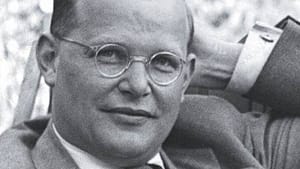Stay in the Loop
BSR publishes on a weekly schedule, with an email newsletter every Wednesday and Thursday morning. There’s no paywall, and subscribing is always free.
The complexities of serenity
Bach@7 presents three pieces by Phillip Moore

Here’s a hot tip for program designers. If you want to create an intensely dramatic program, place three modern pieces in dialogue with three pieces by Bach.
At the last Bach at Seven concert, the three modern pieces were musical settings of prayers by Dietrich Bonhoeffer, the anti-Nazi German theologian. Bonhoeffer wrote the prayers for the prisoners in the concentration camp where he was eventually hanged. They were set to music by Philip Moore, a British organist and composer who seems to have quietly won a place in the long English tradition of cathedral composers.
Moore describes his settings as straightforward, but they didn’t sound that simple to me. He plays the different voices against each other, just as Bach and Handel did, and creates a musical tapestry that is interesting in itself, just as good poets weave their spells with language that is worth hearing for its own sake.
Many contemporary composers write operas and choral works with unembellished vocal lines. They justify this approach on the grounds that the vocal lines express the emotions that go with the text, and that’s all that’s needed. Moore’s settings are a reminder that musical complexity doesn’t detract from the emotional impact of the words. When it’s done as well as Moore does it, it actually intensifies their impact.
In his opening remarks, music director Matthew Glandorf said he saw the Bach selections as a response to Bonhoeffer’s prayers. If you’re a believing Christian, you can hear the response in the words; Bonhoeffer’s “Prayer in time of distress” is answered, for example, by a cantata that says, “Under your protection I am safe from all storms.” But you can also experience it, even if you don’t share Bach’s religious beliefs, through the structure of Bach’s music.
For sooth?
This concert was a perfect answer to the people who ask me what I do and respond, when I tell them I review classical music, by advising me classical music is “soothing.” I’ve been running into that reaction lately and it’s always said with a mild air of dismissal, like a chocoholic admitting milk chocolate may have its virtues.
If you’ve spent your life listening to popular music amplified to the decibel levels created by massed artillery fire, any unamplified music will probably sound soothing. You would probably decide a concert like this had to be soothing merely because Glandorf was conducting an unamplified eight-voice chamber ensemble.
Classical music can have a calming effect, but a word like “soothing” trivializes the experience. The calm we’re talking about is the hard-won serenity attained by individuals who have learned to control and harmonize the conflicts and contradictions that trouble our personalities and disrupt the world we live in. Composers like Bach and Mozart portray that complex, continuously balanced equilibrium in the structure of their work and let us experience it while we listen. They may be just as confused as we are in the rest of their lives, but their music connects us to the restless order at the heart of things.
The strength of the applause at the end of this small scale event caught me by surprise, but it shouldn’t have. Most of the people in the audience had obviously had the same kind of experience I’d been having.
What, When, Where
Bach Festival of Philadelphia, Bach at Seven series: Bach motets, Ich lasse Dich nicht, Jesu meine Freude, Komm, Jesu, Komm. Moore, Morning Prayer, Prayer in Time of Distress, Evening Prayer. Choral Arts Chamber Ensemble: Jessica Beebe, Leslie Johnson, sopranos; Maren Montalbano, Jenifer L. Smith, mezzo sopranos; Christopher Hodson, Jeffrey Cutts, tenors; Jean Bernard Cerin, Daniel Schwartz, basses. Leon Schelhase, organ. Matthew Glandorf, conductor. March 2, 2016 at St. Clement’s Episcopal Church, 21st and Appletree Streets, Philadelphia. 267-240-ALTO or choralarts.com.
Sign up for our newsletter
All of the week's new articles, all in one place. Sign up for the free weekly BSR newsletters, and don't miss a conversation.

 Tom Purdom
Tom Purdom